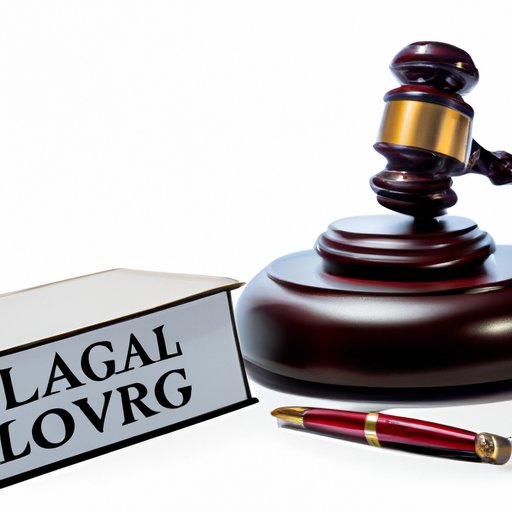
I. Introduction
Legal advice is essential in several situations, from business decisions to personal safety and relationships. However, legal services do not come cheap, and not everyone can afford them. This might lead to poor decision-making that affects a person’s life negatively. Fortunately, there are many ways to seek free legal advice. This article lists down various options available for people seeking free legal help.
II. Seeking Legal Aid from Pro Bono Organizations
Pro bono organizations are law firms or individual lawyers who provide free legal services to people who cannot afford them. These organizations primarily assist low-income individuals, non-profits, and community groups who need legal help. The American Bar Association (ABA) encourages pro bono services as part of their ethical obligations to the legal system. Pro bono services can take various forms, such as direct representation, legal clinics, and court-based services.
Examples of pro bono organizations that offer free legal services are: The Pro Bono Project, Legal Aid Society, LawWorks, and Public Counsel Law Center. Check with your local bar associations or the ABA for pro bono organizations in your area.
When seeking legal aid from a pro bono organization, the applicant must meet certain guidelines and criteria. Primarily, the applicant must prove that they cannot afford a lawyer. The requirements and services offered vary with each organization, so it is crucial to check each organization’s guidelines before seeking aid.
III. Finding Free Legal Clinics
Free legal clinics are events where individuals can meet with volunteer lawyers to ask questions, receive advice, and even representation in some cases. These clinics might address various legal issues such as family law, immigration, real estate, or small claims. Law schools, non-profits, and lawyers’ organizations conduct legal clinics regularly.
Examples of free legal clinics held by law schools and non-profits are: The Legal Aid Foundation of Los Angeles, UCLA Law School Community Law Clinics, and the Legal Services of Eastern Missouri.
When planning to attend a free legal clinic, prepare adequately by studying the community resources, emergency preparedness, and disaster precaution tips offered on the clinic’s website. Understand the types of issues the clinic covers, the legal implications, and bring all the necessary documents and letters.
IV. Utilizing Legal Hotlines
A legal hotline is a phone service that offers free legal advice to callers. These hotlines are staffed by volunteer lawyers who donate their time after hours to assist those in need. Legal hotlines are meant to provide free legal advice only, and not legal representation or advocacy. They offer brief and general advice on various legal topics.
Examples of legal hotlines that provide free legal advice are: Legal Hotline, LawAccess NSW, and the Legal Aid Society of Hawaii.
When calling a legal hotline, be sure to have all relevant information and documents ready, as well as a list of questions to ask. Legal hotlines may have limited hours and coverage, so call during the hours listed and remain patient.
V. Contacting State or Local Bar Associations
State or local bar associations act as professional organization for lawyers and provide information and resources to the public. These organizations often offer free legal advice and referral services through their websites or telephone hotlines. Referral services may refer the applicant to a low-cost or pro bono lawyer depending on the case’s nature.
Guidelines for contacting state or local bar associations are easy. Locate the bar association in your state and look for the resources offered on their website. Alternatively, call the contact number for the bar association and ask for available services.
VI. Using Online Legal Resources
The internet offers an array of legal resources ranging from free online legal advice to legal information that helps people handle legal issues themselves. These resources might include downloadable documents, videos, articles, how-to guides, and Q&A forums.
Examples of sites that provide free legal information are: Nolo, FindLaw, and Legal Information Institute.
However, free online legal advice often comes with a disclaimer that it should not be regarded as a substitute for legal representation or advice.
VII. Seeking Legal Aid from Law Libraries
A law library is a public library that specializes in law books and materials. These libraries provide legal information to judges, lawyers, and the public. Some law libraries offer free legal research and resources, as well as assistance from a law librarian. You can access legal databases and other sources of legal information in law libraries.
Guidelines for visiting a law library and utilizing its resources to seek free legal advice are to research the law library beforehand to learn about its hours of operation and available resources. Be respectful of the library book retention policies and noise levels. At any rate, consult with a law librarian and ask for assistance with research.
VIII. Turning to Non-profit Legal Services
Non-profit legal services are organizations that offer legal representation to individuals who cannot afford them. These organizations receive government funding, private donations, and grants to assist low-income individuals with their legal issues. Non-profit legal services handle various civil legal issues, such as housing, employment, domestic violence, disability, and veterans’ benefits.
Examples of non-profit legal services in your area are: Legal Services Corp., National Legal Aid and Defender Association, and the Legal Aid Society. Check websites of non-profit legal services near you to understand the eligibility criteria and resources available.
When accessing non-profit legal services ensure that you bring all relevant documents, avoid lying or manipulating the facts of your case, and establish realistic solutions.
IX. Conclusion
Legal advice is important, and everyone deserves access to it regardless of their financial situation. There are various options available for seeking free legal advice, including pro bono organizations, legal clinics, legal hotlines, state or local bar associations, online legal resources, law libraries, and non-profit legal services. Seek legal advice early, as legal issues might have serious consequences.
This article encourages individuals to take the necessary steps to seek free legal advice when needed.




